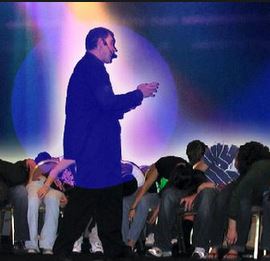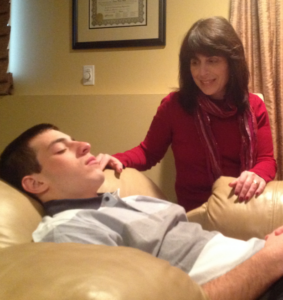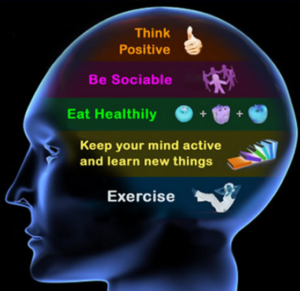
Video: Listening to hypnosis
This video explains the proper way to listen to a hypnotherapy session.

This video explains the proper way to listen to a hypnotherapy session.

 When “Comedy Hypnotist” Chris Jones invited celebrity judge Howie Mandel on stage and hypnotized him on the competition show “America’s Got Talent,” the performance brought the audience to its feet and even inspired a social media hashtag, #HowieShakesHands.
When “Comedy Hypnotist” Chris Jones invited celebrity judge Howie Mandel on stage and hypnotized him on the competition show “America’s Got Talent,” the performance brought the audience to its feet and even inspired a social media hashtag, #HowieShakesHands.
Mandel, who struggles with obsessive compulsive disorder, followed Jones’ cues and for the first time in more than eight years, the germaphobe shook hands with his fellow judges. The seemingly instant transformation was so surprising, some viewers thought it was an act, Mandel said it was not.
But according to David Spiegel, professor of psychiatry and behavioral sciences at Stanford University, not only is hypnotherapy legitimate, it’s “literally the old est Western conception of a psychotherapy.”
Moreover, Wesley Anderson, a practicing hypnotherapist for more than 20 years, said, “Most people experience some form of a hypnotic state every day.” “If you’ve ever been lost in a daydream or zoned out and missed your turn while driving your usual route, you’ve experienced a form of hypnosis,” he said.
Does it really work?
Spiegel has been conducting studies about the benefits of hypnosis for more than 40 years and he said there is no doubt that hypnosis works as an effective therapeutic technique to manage pain and kick bad habits.
In 2000, Spiegel and his colleagues determined that patients using hypnosis as a part of a comprehensive treatment plan could significantly reduce drug use and procedure time.
“Lowering those two meant an average cost savings of approximately $338,” Spiegel said.
A 2007 article in the Journal of the National Cancer Institute doubled that figure, finding that a hospital saved $772 per patient in the hypnosis group, mainly due to reduced surgical time. “Patients who received hypnosis reported less post-surgical pain, nausea, fatigue and discomfort,” according to a release from the American Psychological Association.
“Patients who received hypnosis reported less post-surgical pain, nausea, fatigue and discomfort,” according to a release from the American Psychological Association.
Hypnosis has its skeptics, partly because while studies seem to show it has tangible benefits, it’s most often used in tandem with other treatments; scientifically quantifying its success alone is difficult. From comedy performers such as Jones to Harvard educated psychiatrists such as Spiegel, anyone can learn to hypnotize and call themselves a “hypnotist,” which also gives doubters pause.
Three states — Colorado, Connecticut and Washington — require mandatory licensing requirements from individuals wanting to practice hypnotherapy.
According to the American Society of Clinical Hypnosis, or ASCH, most insurance companies will cover 50% to 80% of the cost of individual therapy, but only if treated by licensed professionals. ASCH requires its members to be licensed health care workers and, at minimum, have a master’s degree.
The National Board for Certified Clinical Hypnotherapists, on the other hand, requires applicants have a graduate-level degree as well as 50 hours of classroom instruction and 30 hours of clinical training.
How does it work?
The first thing Anderson does when meeting a new client is what anyone would do upon meeting a stranger: He gets to know them. “I try to establish a rapport and establish the client’s intentions for hypnosis,” Anderson said.
Using verbal and nonverbal cues, a hypnotherapist will help the client quiet their peripheral, conscious mind, the part that’s constantly stimulated by outside sources. Clients will relax, their posture will adjust and they will usually become very still, Anderson said. “They’re halfway between being completely asleep and completely awake,” he explained.
In this trance-like state, the part of the brain responsible for the subconscious, non-logical thoughts can become wide open to suggestions. “The normal adult filters and belief systems of what is and what isn’t will start to fade,” he said. “Clients become almost childlike.” Hypnotherapists can then begin to use imagery and suggestion to help them start thinking about their bad habits or their pain differently.
 For radio host Jenn Hobby, who underwent hypnosis to help her kick her smoking habit, that meant tapping into her relationship with her goddaughter, who at the time of her session, was just a toddler. Her hypnotherapist told her to imagine her goddaughter playing outside and running around the playground.
For radio host Jenn Hobby, who underwent hypnosis to help her kick her smoking habit, that meant tapping into her relationship with her goddaughter, who at the time of her session, was just a toddler. Her hypnotherapist told her to imagine her goddaughter playing outside and running around the playground.
“Then he said, ‘now imagine giving her a lit cigarette,'” Hobby remembers. “That really hit home, more than anything else.” When she left the office that day, she felt differently about cigarettes and smoking. Helping clients manage pain, Anderson said, he often counsels them to turn down receptors that might cause them discomfort the same way a plumber might turn off water before working to repair a leak.
“The pain signals might be there, but they wouldn’t make it into awareness,” Anderson said. Feeling ‘somewhat betrayed’ What’s vital to the process, Anderson and Spiegel said, is that both parties — hypnotherapist and client — agree to the intentions of the session beforehand. Mandel said he agreed to participate in the segment and said he knew what he was doing the entire time, but he never established a rapport with his hypnotist.
So while his “handshaking breakthrough” seemed like a positive thing, for Mandel, the former “Deal or No Deal” host said he felt “somewhat betrayed” after he watched the episode. “I was upset about it and it’s hard for me to watch,” Mandel told NBC’s Savannah Guthrie.
Spiegel said Mandel’s reaction to his experience is understandable. “When entertainers with no knowledge or concern for clinical care take advantage of a real phenomenon, real people can feel exposed, tricked or humiliated,” he said.
Only one part of the puzzle
Despite the success of Hobby’s hypnosis experience — she’s only had a few cigarettes since — she said being hypnotized wasn’t the only thing that led to her quitting. ”
There’s no magic pill. You have to be really committed to change your behavior,” she said. Spiegel agreed. Hypnosis, while valuable, is only one part of the comprehensive treatment puzzle. “Anything that can help a patient that much is worth looking into,” he said.
By: Stephanie Gallman, CNN
 Hypnosis is synonymous with stage entertainment where the performer puts volunteers from the audience into a trance and commands them to do embarrassing things.
Hypnosis is synonymous with stage entertainment where the performer puts volunteers from the audience into a trance and commands them to do embarrassing things.
This makes it sound like a joke, but in fact hypnosis is a real phenomenon and it is proving increasingly useful to psychologists and neuroscientists, granting new insights into mental processes and medically unexplained neurological disorders.
That’s according to David Oakley and Peter Halligan who have written an authoritative new review, debunking hypnosis myths, and covering ways that neuroscience is shedding light on hypnosis and ways hypnosis is aiding neuroscience.
Despite popular folklore, hypnosis is not a form of sleep (this misconception isn’t helped by the fact that hypnosis studies typically label the control condition the “waking state”). However, Oakley and Halligan say new brain imaging findings do support the contention that hypnosis is a distinct form of consciousness.
After successful hypnotic induction, which involves using mental strategies to reach “a focused and absorbed attentional state”, participants show reduced activity in parts of the brain’s default mode network together with increased activity in prefrontal attentional systems. Oakley and Halligan concede that “it remains to be seen if these particular changes are unique to hypnosis.”
After hypnotic induction (or in some cases even without it) participants exposed to suggestive statements can experience altered perceptual or bodily sensations.
For instance, told that their arm is getting heavier and they cannot move it, a suggestible participant may experience paralysis of the arm. Sceptics may wonder  about the veracity of these experiences but brain imaging results are indicating they are real and not merely imagined.
about the veracity of these experiences but brain imaging results are indicating they are real and not merely imagined.
Consider a study of participants hypnotized and induced to see colorful Mondrian images in grey. Brain scan results of these participants showed altered activity in fusiform regions involved in color processing, and crucially such changes weren’t observed when the participants merely imagined the Mondrians in grey.
Another study showed that the famous Stroop effect disappeared when hypnotized participants received the suggestion that they would see words as meaningless symbols.
Another line of research explores the correlates of hypnotic suggestibility. Apparently, it is a highly stable trait and it is heritable.
It doesn’t correlate with the main personality dimensions but does correlate with creativity, empathy, mental absorption, fantasy proneness and people’s expectation that they will be prone to hypnotic procedures.
 Many neurological symptoms are medically unexplained with no apparent organic cause and it is here that hypnosis is proving especially useful as a new way to model, explore and treat people’s symptoms.
Many neurological symptoms are medically unexplained with no apparent organic cause and it is here that hypnosis is proving especially useful as a new way to model, explore and treat people’s symptoms.
For instance people can be hypnotized to experience limb paralysis in a way that appears similar to the paralysis observed in conversion disorder.
People can also be hypnotically induced to experience the sense that there is a stranger looking back at them when they peer in a mirror – an apparent analogue of the real “mirrored-self-misidentification delusion”.
Hypnosis research is also exposing the apparent volitional element to mental phenomena previously considered automatic.
For example, a patient who experienced face-color synaesthesia received post-hypnotic suggestion that abolished the colors she usually sees with faces (as confirmed by a color-naming task in which faces no longer had an interfering effect).
“The psychological disposition to modify and generate experiences following targeted suggestion remains one of the most remarkable but under-researched human cognitive abilities given its striking causal influence on behavior and consciousness,” said Oakley and Halligan. (Oakley DA, and Halligan PW 2013)

What hypnotherapy is and isn’t, how it works, and what to expect in a session.


This is the most frequently asked question I get from prospective clients. My typical response is that ‘if you want to be hypnotized then that’s what will happen’. It’s not a battle of wills. We all have the natural ability to shift awareness from being fully awake and alert, to a daydream state.Once a new client makes the hypnosis-daydream connection, I teach them how to do hypnosis well, to not focus, concentrate or try. Trying to be hypnotized is a conscious effort, which only gets in the way.
Clients are instructed to allow their thoughts to travel, drift, and wander wherever they chose to go, even to the point of not being tuned into what is being said. This approach makes it very easy to transition into hypnosis and enables clients to descend deeply into subconscious thought, which enhances the overall effect of the session.
 Effective hypnotherapy relies on a relationship of trust and cooperation. If clients trust that I am going to try to help them fix whatever problem they have, then they will likely have a positive experience.
Effective hypnotherapy relies on a relationship of trust and cooperation. If clients trust that I am going to try to help them fix whatever problem they have, then they will likely have a positive experience.
I’ll occasionally get an apprehensive client so I’ll ask them if they are open to the experience of simple relaxation and if it would be okay for me to help them relax. I have never had anyone refuse such a comforting offer.
Then we begin with some simple breathing techniques which automatically gets the relaxation ball rolling and then I’ll transition into the formal session which supports whatever particular goal or challenge they have in mind.
So anyone who wants to be hypnotized certainly can be. All you need is an open mind and the desire to relax.
By: Paul Gustafson RN CH
Thanks for sharing your story with us Paul. So, let’s start at the beginning and we can move on from there.
After working for 10 years at Massachusetts General Hospital and in homecare Hospice as a Registered Nurse, I was ready for a change and wanted to pursue self-employment. I was interested holistic modalities and had used Hypnosis for my own public speaking phobia while in college, and it worked great.
After leaving nursing, I spent 3 months searching for the right path and when someone mentioned Hypnotherapy as a possibility, it caught my attention. After taking my first certification course I instantly had a good feeling about it.
I opened my practice, ‘Burlington Hypnosis’, in October of 2001. Soon I was fortunate to appear on Boston radio, WBZ 1030AM, which soon led to an appearance on WCVB TV’s ‘Chronicle’. My practice quickly grew and in 2007 I started hosting my own cable TV show ‘Healthy Hypnosis’ which I marketed to 25 Greater Boston communities.
My medical background as a Registered Nurse sets me apart from most of my colleagues, especially when working with clients who have medically based difficulties. I better understand their situations and can use Hypnotherapy to help them find relief.
We’re always bombarded by how great it is to pursue your passion, etc – but we’ve spoken with enough people to know that it’s not always easy. Overall, would you say things have been easy for you?
Being self-employed in any field is challenging and at times overwhelming. In spite of such a quick start to my new practice, I was still trying to make a living in one of the most misunderstood, disregarded fields there is.
Initially, I thought I would easily get referrals from the mainstream medical community because of my medical background, but this was not the case. New England has very deep, old-school roots, so getting my foot in that door never really happened the way I thought it would.
Another challenge involved the craft itself. In order to generate word of mouth referrals, I needed to be good. Becoming a confidently, effective Hypnotherapist took time and practice. So I offered free sessions, spoke to any group that would have me, and slowly established my hypnotic comfort zone.
Thankfully I made a few friends in the field over the years and we often compare notes, techniques and share frustrations which has been a big help to all of us over the years.
Times got so tough I even tried to leave the field a few times, but I always came back. Being able to help people in need with Hypnotherapy is an incredibly fulfilling experience. I am so grateful to have stumbled into this profession and stuck with it as long as I have.
So let’s switch gears a bit and go into the Burlington Hypnosis story. Tell us more about the business.
I am a sole proprietor in every sense of the word. I am directly involved in web design and optimization; social media and marketing; producing my TV show and editing video as well as writing and recording a wide array of Hypnotherapy programs covering most of the typical day-to-day problems that people struggle with.
I see many clients dealing with a wide array of stress/fear related problems including exam performance, fear of flying and public speaking. I also see many struggling with chronic generalized anxiety, confidence issues, and even depression.
My medical background serves me well-helping individuals with peripheral neuropathy pain, irritable bowel syndrome, tinnitus, and substance abuse. Hypnotherapy enhances the mind-body connection which can offer relief in ways one might not ever expect.
The program I am most proud of is my Virtual Gastric Band weight loss program. This unique approach guides individuals to imagine that they have undergone a medical procedure to ensure weight loss. Initially, I was reluctant to get into this application because I have always been against the real-life surgical approach, but I quickly learned how effective it is. I routinely have clients reporting more than 40-pound weight loss and have many video testimonials posted on my site.
What sets me apart from many of my colleagues is not only my medical experience in general but specifically my work in homecare Hospice. It was important to gain trust and develop a rapport with these patients and their families, and the best way achieve this is to simply listen. The art of listening is very therapeutic for patients in Hospice as well as with my Hypnotherapy clients.
Has luck played a meaningful role in your life and business?
I was lucky in so many ways throughout my 16-year career as a Hypnotherapist, starting with the uniquely unexpected conversation with a local practitioner, who first mentioned the field of Hypnotherapy. I saw her ad in the local paper about her Reiki practice so I called. She took the time to speak with me about holistic modalities and she also put me in touch with my first Hypnosis instructor.
I was also lucky when discussing this option with my wife. If she hesitated at all I probably would never have taken this path. Thankfully there was no hesitation; she instantly said that if I thought it felt right I should proceed.
Luck was also in my corner when one of my very crude brochures landed on the desk of Paul Sullivan at WBZ radio. He hosted a nightly talk show and thought I would make an interesting guest to interview. This lucky connection began a 15-year relationship with WBZ. Unfortunately, Paul passed away in 2007. His replacement Dan Rea said that ‘if I was good enough for Sully I was good enough for him.’ I have been on with Dan twice/year since.
Luck continued to carry me when I sent an audio CD of my first WBZ appearance to WCVB-TV and was soon contacted to appear on an episode of ‘Chronicle’ dedicated to Hypnosis.
I was certainly desperate to make this new career track happen, and looking back it seems as though the universe was right there guiding me every step of the way. I got to continue making important connections with people in need and don’t feel like I’ve worked a single day yet.